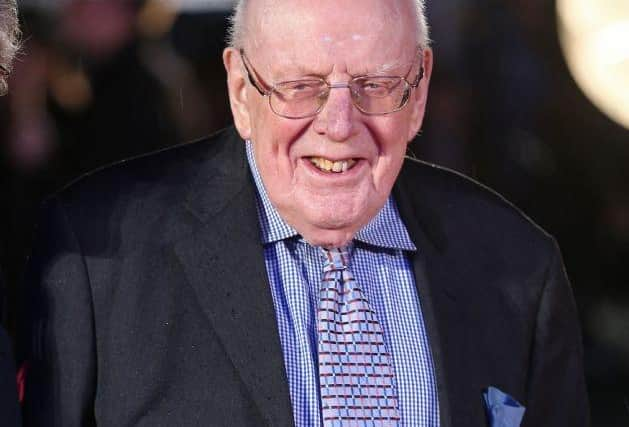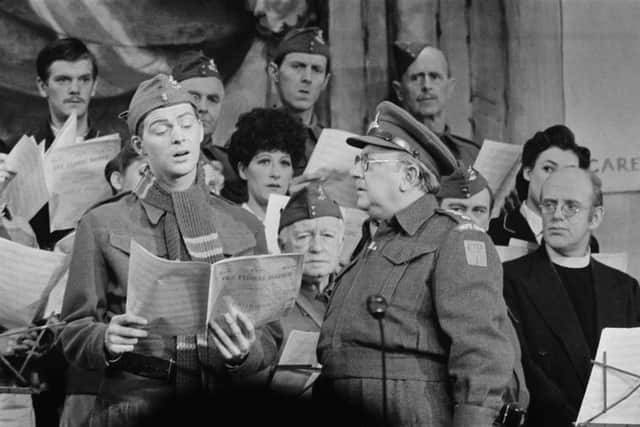Scotsman Obituaries: Frank Williams, actor who played vicar in Dad's Army
One of the last surviving regulars from the cast of Dad’s Army, Frank Williams made such an impact as the vicar on the much-loved classic sitcom that many people thought he really was a clergyman. Several couples asked him to officiate at their weddings.
He did not join the cast of Dad’s Army until the first episode of series three in 1969 and even then it was intended as a one-off appearance.
Advertisement
Hide AdAdvertisement
Hide AdBut his clashes with the pompous Captain Mainwaring over the use of the church hall and office became a regular feature of the show over the next eight years.


A camp, extremely fussy, rather huffy character, the Reverend Timothy Farthing resisted attempts to allow preparations for a Nazi invasion to interfere with his normal routine, his enthusiasm for campanology and a glass or two of whisky, and his devotion to the boys in the church choir and the local scout troop.
Despite his distaste for the war and the military – and indeed, anything rough or uncouth, the vicar often found himself caught up in the misadventures of the Walmington-on-Sea Home Guard, although he did join the platoon for a short while, when Mainwaring was away.
Williams remained with the show for another six series and the final instalment in 1977. He was in the 1971 feature film adaptation. And he was the only actor from the classic incarnation of Dad’s Army to reprise his original role in the misjudged 2016 feature film, starring Toby Jones and Bill Nighy, though Ian Lavender had a cameo as a brigadier – not called Pike, obviously, that would have been stretching credibility a little too far.
Williams also appeared in a stage version of Dad’s Army that played in the London West End and toured English theatres in 1975-76 and he reprised the character in radio adaptations in the mid-1970s.


He also played a vicar on episodes of All Gas and Gaiters, Hi-De-Hi! and Hallelujah!, with Thora Hird.
He was an archdeacon in Vanity Fair. And he had a regular role as a bishop in the sitcom You Rang, M’Lord?, which was created by David Croft and Jimmy Perry, the writing team behind Dad’s Army.
And although he was not a clergyman in real life, Williams did serve three terms in the 1980s and 1990s as a layman on the General Synod, the governing body of the Church of England.
Advertisement
Hide AdAdvertisement
Hide AdHe passionately opposed the ordination of women, leaving the assembly in tears when he lost the vote, though he was a keen supporter of gay rights.
An only child, Frank John Williams was born in London in 1931. His family had a successful drapery business and his father had retired by the time Williams was born. He was always interested in acting and as a boy would cajole friends into appearing in shows he had written.
At school Williams much preferred acting to sports, which he found frightening. He was, however, forced to join the military training corps, though he later commented, sounding very like his Dad’s Army character: “You were able to get out of marching and all that stuff by getting captured early on and having a lie down in the sun until all the silly business was finished.”
In his final year at school Williams appeared in a production of the comedy thriller The Ghost Train, which was written by Arnold Ridley, who would later act alongside Williams in Dad’s Army, playing the aged Private Godfrey.
Williams trained as a stage manager at the Gateway Theatre in London and got to appear in small acting roles – literally small, as he played a snail and an ant. Within a few years he was also appearing on television, playing a Borstal inmate in one early show.
His big break came in the late 1950s on the sitcom The Army Game with the recurring role of Captain Pocket in about 70 episodes.
He also appeared in a 1961 dramatisation of Anna Karenina alongside Claire Bloom and a young, pre-Bond Sean Connery.
In the late 1950s Williams worked at the Palace Theatre in Watford, which was run by the actor and writer Jimmy Perry and his wife Gilda. Williams also wrote plays and the Palace staged two of them.
Advertisement
Hide AdAdvertisement
Hide AdIn the early 1960s Williams appeared in several episodes of the sitcom Hugh and I, which was produced by David Croft.
When Perry and Croft got together on Dad’s Army they were both familiar with Williams’ work and the offer of a one-off appearance evolved into his character becoming a staple of the show.
As well as his frequent appearances on television as clergymen, Williams also acted in numerous films, including three with Norman Wisdom.
His stage acting stretched from pantomime to William Shakespeare. He played Quince in Jonathan Miller’s 1997 West End production of A Midsummer Night’s Dream. His own plays were thrillers.
In the 1990s Williams co-founded the Dad’s Army Appreciation Society with fellow actor Bill Pertwee, who had played the air raid warden Hodges, and in 2002 he published his autobiography entitled Vicar to Dad’s Army: The Frank Williams Story.
Williams lived with the actor Ronnie Grainge, who appeared in the stage production of Dad’s Army and who survives him.
OBITUARIES
If you would like to submit an obituary (800-1000 words preferred, with jpeg image), or have a suggestion for a subject, contact [email protected]
SUBSCRIBE
Subscribe at www.scotsman.com/subscriptions
